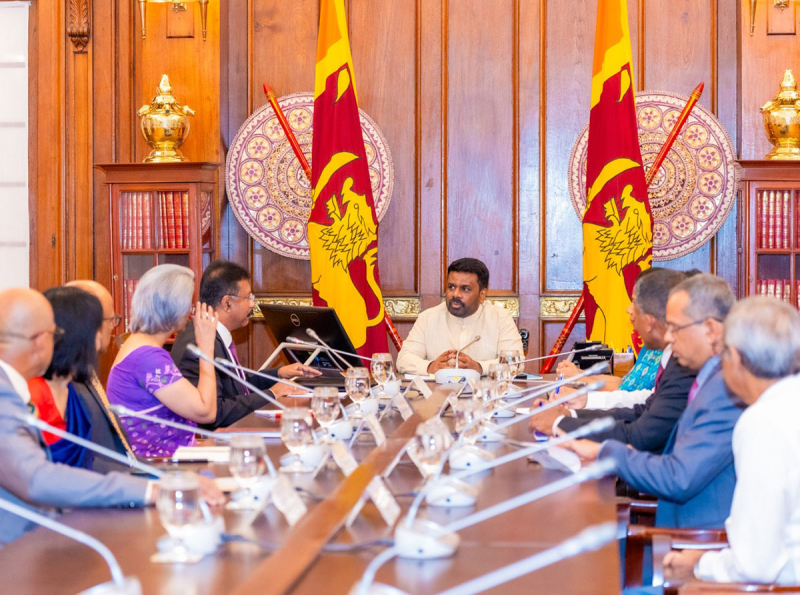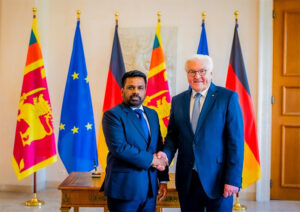
Government’s Governance Hurdles, Diplomatic Gaps, and Internal Discord
- CNL Reporter
- June 15, 2025
- Weekly Political Review
- Diplomatic
- 0 Comments
Weekly Political Review
Wide Angle focuses on NPP’s Scandals, Opposition Pressure, and Global Scrutiny
By Rohana Jith
Just slightly over eight months into its term, President Anura Kumara Dissanayake’s National People’s Power (NPP) government is confronting the full weight of realpolitik. Having risen to power with a reformist mandate, the administration is finding that ideals often collide with the complex mechanics of governance. As a host of internal and external challenges converge, the ruling coalition’s grip on political authority is already showing signs of strain.
From contentious battles over local council leadership to damaging scandals involving the prison system and customs procedures, the NPP’s governance narrative is rapidly becoming one of reactive firefighting rather than strategic leadership.
At the same time, diplomatic ventures are raising eyebrows for missed opportunities and soft-power missteps, while the economy remains fragile and under the close scrutiny of international financial institutions.
Colombo Council Tensions: A Microcosm of National Politics
The political contest for control of the Colombo Municipal Council (CMC) has emerged as a symbolic showdown between the NPP and a regrouping opposition. While the NPP secured 151 local councils outright during the recent election, it did not obtain a majority in several key urban councils, including Colombo. Nonetheless, it has asserted a moral right to govern where it emerged as the largest party.
With 48 of the 117 CMC seats, the NPP finds itself 11 short of a majority. Yet, it has publicly declared confidence in electing Vraie Cally Balthazaar as Mayor, suggesting it has secured the needed support. Meanwhile, opposition forces—primarily the Samagi Jana Balawegaya (SJB), the United National Party (UNP), and others—have consolidated 69 seats, giving them the numerical edge.
Unofficial reports claim SJB’s Reza Sarook has the backing of 62 councilors, though this tally excludes key players like UNP’s Tony Ramzi and Sarvajana Balawegaya members who have pledged neutrality.
As negotiations and political manoeuvring reach fever pitch ahead of the mayoral vote, the outcome will serve as a litmus test for both the NPP’s ability to retain urban influence and the opposition’s unity.
Further complicating the situation is an alleged backroom agreement to name UNP’s long-serving councilor Kithsiri Rajapakse as Deputy Mayor—a move that signals calculated concessions and possible deal-making that extends beyond ideological boundaries.
The Presidential Pardon Scandal: A Blow to Credibility

Simultaneously, a far more troubling controversy has engulfed the government. The release of convicted fraudster Athula Tilakaratne—who was imprisoned for misappropriating Rs. 4 million—on what was claimed to be a Vesak presidential pardon has triggered an official investigation by the Criminal Investigation Department (CID). The anomaly? His name did not appear among the 388 inmates originally recommended for clemency.
This scandal has already seen the arrest of Anuradhapura Prison Superintendent Mohan Karunaratne and Commissioner General of Prisons Thushara Upuldeniya. More worryingly, it has exposed potential systemic abuse in the presidential pardon process, with law enforcement now probing whether additional ineligible inmates were similarly released under dubious conditions.
The affair has delivered a significant reputational hit to the NPP government, calling into question its adherence to transparency, rule of law, and administrative accountability—ironically, the very principles on which its electoral appeal was founded.
Container Scandal: Opposition Strikes Back
Fueling the fire is another major allegation—this time over the illegal release of 323 red-flagged containers from Colombo Port in January without required customs inspections. Pivithuru Hela Urumaya (PHU) leader Udaya Gammanpila has been leading the charge, presenting a detailed list of companies and shipments allegedly released under direct government orders.
He has named President Dissanayake, Ports and Civil Aviation Minister Bimal Rathnayake, and Deputy Minister Janitha Ruwan Kodithuwakku as the central actors behind the irregular release.
While Deputy Minister Kodithuwakku maintains that official investigations are already underway and that the matter is being politicised, the government’s silence and perceived deflection have only intensified public suspicion.
The incident reflects serious gaps in regulatory oversight and once again puts the government on the defensive over accountability. At a time when the administration seeks to inspire confidence among international investors and citizens alike, such scandals carry not just political but economic costs.
Germany Visit: Symbolic Wins, Strategic Gaps

President Dissanayake’s recent official visit to Germany was framed as a diplomatic success by government media and the German Embassy in Colombo. Indeed, the ceremonial reception by President Frank-Walter Steinmeier and high-level meetings on trade and vocational training gave the trip substance.
However, critics have been quick to point out that the absence of a meeting with Chancellor Friedrich Merz—Germany’s head of government—undermined the visit’s strategic value.
Comparisons have been drawn to former presidents Maithripala Sirisena and Chandrika Kumaratunga, who both met with German chancellors during their official visits, suggesting that AKD’s government may lack the diplomatic gravitas of its predecessors.
Nevertheless, the visit provided important exposure and underscored Germany’s support for Sri Lanka’s democratic journey, rule of law, and Indo-Pacific alignment.
The President’s address to the DIHK Business Forum and meetings with tourism and trade representatives were key opportunities to position Sri Lanka as an investment destination. Yet, without direct engagement at the topmost levels of power in Germany, the impact of the visit may prove more symbolic than transformative.
International Scrutiny: IMF and UNHRC

Adding to the pressure, two powerful global institutions—the International Monetary Fund (IMF) and the United Nations Human Rights Council (UNHRC)—are now setting their sights on Sri Lanka.
A high-level IMF delegation led by First Deputy Managing Director Gita Gopinath is currently in the country to assess progress on the bailout programme. Among the conditions under review is the controversial implementation of a pricing formula for electricity tariffs—a politically sensitive issue likely to affect public sentiment.
Meanwhile, UN High Commissioner for Human Rights Volker Türk is due to visit Sri Lanka later this month. His itinerary includes meetings with President AKD and senior officials, as well as trips to areas outside Colombo. His findings will be compiled into a report to be presented at the UNHRC in September—adding further international oversight to an already embattled administration.
Both the IMF and UNHRC visits represent a double-edged sword: a chance for the government to demonstrate reformist progress, but also a risk of international censure if commitments remain unfulfilled.
Economic Indicators: A Nation in Hesitation
At home, economic uncertainty continues to cast a long shadow. A recent revelation by the Inland Revenue Department (IRD) suggests that a large volume of Rs. 5,000 banknotes released into circulation is unaccounted for—implying that citizens are hoarding cash rather than depositing it in banks. This is attributed to low interest rates and a general mistrust of the financial system.
Such behaviour reflects public anxiety over economic stability and weak confidence in institutional responses. For the NPP, rebuilding this trust is essential—but will require consistent, credible policy moves that so far have been difficult to execute amidst political turbulence.
China Relations and Party Diplomacy
In a parallel development, the NPP appears to be strengthening ties with China. Two new Memoranda of Understanding were signed at the 8th China-Sri Lanka Joint Trade and Economic Commission meeting, aimed at deepening industrial and supply chain cooperation.

Additionally, a JVP delegation led by Tilvin Silva visited China on an invitation from the Chinese government. Visits to rural development initiatives in Daxing and Huzhou suggest that the JVP is keen to draw policy insights from China’s governance model. The deepening rapport between the JVP and the Communist Party of China (CPC) signals a strategic alignment that could influence Sri Lanka’s long-term foreign policy orientation.
Conclusion: Early Fault Lines in a Reformist Project
The first few months of the NPP’s administration have revealed just how fraught governance can be, even for a party propelled by high ideals and public frustration with the political status quo. From municipal power struggles and administrative scandals to diplomatic stumbles and international pressure, President Dissanayake’s government is learning the hard way that change, while popular in theory, is brutally difficult in practice.
The coming weeks will be critical. The outcome of the Colombo mayoral race, the handling of CID investigations, and the feedback from the IMF and UNHRC will either bolster or severely undermine the government’s credibility.
The NPP promised a clean break from the politics of patronage and corruption. Whether it can live up to that promise—or become yet another casualty of Sri Lanka’s cyclical political disappointments—remains to be seen. But one thing is certain: the honeymoon period is over, and the real test of leadership has begun.

